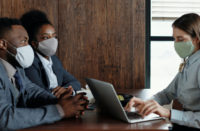Fear is one of the seven universal emotions experienced by everyone around the world. Fear arises with the threat of harm, either physical, emotional, or psychological, real or imagined. While traditionally considered a ‘negative’ emotion, fear actually serves an important role in keeping us safe as it mobilizes us to cope with potential danger.
An unpleasant feeling caused by fear. The natural response to fear is actually a chain reaction in the brain that begins with a stressful stimulus and ends with the release of chemicals that cause a racing heart. Fast breathing and energized muscles.
There is also another type of fear. Its common label is anxiety which a less fundamental emotion that arises purely from our own thoughts, not external reality. This type of fear is self-generated.
Common fear triggers?
- Heights and flying
- Water and fire
- Snakes, rodents, spiders and other animals
- Social interaction or rejection
- Darkness
- Death or dying
What does fear feel like?
- Sweat a lot
- Muscles feel weak
- Stomach churns or bowels feel loose
- Breath very fast
- Feel dizzy
- Heart beats very fast-may be it feels irregular
- Feel frozen to the spot
- Hot and cold sweats
- Get a dry mouth
- Get very tense muscles
How to overcome fear?
- Prepare, practice, role play.
- Sit with your fear for a few minutes, experience it, name it, get to know it, and take it by the hand so it can become your friend.
- Embrace fear as instruction and let it inform your actions, but not control them.
- You can use humor to deflate your worst fears.
- visualize success and have a positive attitude.
- Appreciate your courage and be kind to yourself.
- We are afraid of nothing so much as the unknown. If your fear is based on a lack of information- educate yourself.
- Follow others with experience in this field and find a recipe.
- Know yourself better, if you experience it often it could be a good idea to keep a journal about it.








